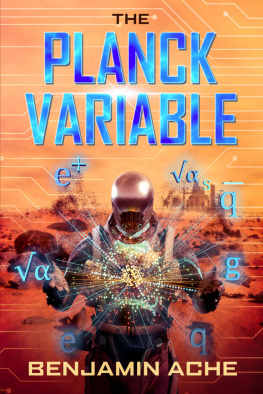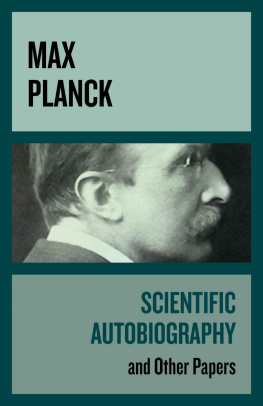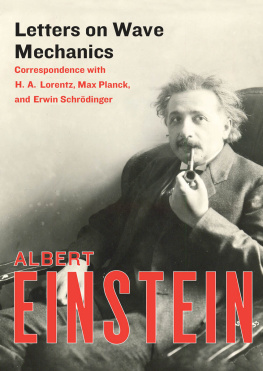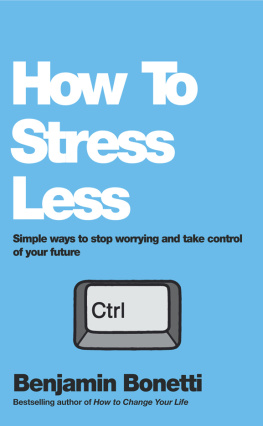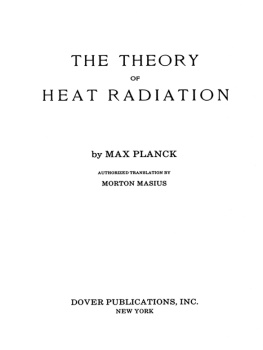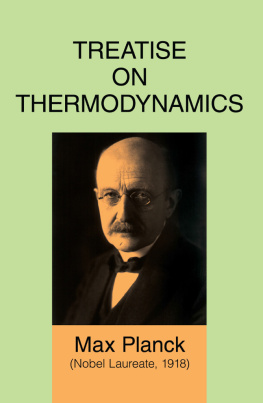Benjamin Ache [Ache - The Planck Variable
Here you can read online Benjamin Ache [Ache - The Planck Variable full text of the book (entire story) in english for free. Download pdf and epub, get meaning, cover and reviews about this ebook. year: 2019, publisher: Benjamin Ache, genre: Detective and thriller. Description of the work, (preface) as well as reviews are available. Best literature library LitArk.com created for fans of good reading and offers a wide selection of genres:
Romance novel
Science fiction
Adventure
Detective
Science
History
Home and family
Prose
Art
Politics
Computer
Non-fiction
Religion
Business
Children
Humor
Choose a favorite category and find really read worthwhile books. Enjoy immersion in the world of imagination, feel the emotions of the characters or learn something new for yourself, make an fascinating discovery.
- Book:The Planck Variable
- Author:
- Publisher:Benjamin Ache
- Genre:
- Year:2019
- Rating:3 / 5
- Favourites:Add to favourites
- Your mark:
- 60
- 1
- 2
- 3
- 4
- 5
The Planck Variable: summary, description and annotation
We offer to read an annotation, description, summary or preface (depends on what the author of the book "The Planck Variable" wrote himself). If you haven't found the necessary information about the book — write in the comments, we will try to find it.
Benjamin Ache [Ache: author's other books
Who wrote The Planck Variable? Find out the surname, the name of the author of the book and a list of all author's works by series.
The Planck Variable — read online for free the complete book (whole text) full work
Below is the text of the book, divided by pages. System saving the place of the last page read, allows you to conveniently read the book "The Planck Variable" online for free, without having to search again every time where you left off. Put a bookmark, and you can go to the page where you finished reading at any time.
Font size:
Interval:
Bookmark:
THE PLANCK VARIABLE
Benjamin Ache
The Planck Variable
Copyright 2019 by Benjamin Ache.
All Rights Reserved.
No part of this book may be reproduced in any form or by any electronic or mechanical means including information storage and retrieval systems, without permission in writing from the author. The only exception is by a reviewer, who may quote short excerpts in a review.
Cover design by Ian Anderson.
Editor: Pat LoBrutto
This book is a work of fiction. Names, characters, places, and incidents either are products of the authors imagination or are used fictitiously. Any resemblance to actual persons, living or dead, events, or locales is entirely coincidental.
Benjamin Ache
Visit my website at www.benjaminache.com
ISBN-13: 978-1-09-517589-7
Contents
Im late!
Planck bolted upright in his chair. The glass surface of his desk had left a cherry-red imprint on his cheek. He didnt even remember laying his head down.
I must have fallen asleep.
Slowly, the fog began to clear from his eyes. A peeled strip of display wallpaper oscillated back and forth from the draft of the overhead ventilation fan, dancing shadows about his bedroom. Years of wear had caused the adhesive to delaminate from the flexible substrate, but the organic light-emitting diodes were still able to intermittently transmit their electroluminescent image.
The title of a scientific journal publication was warped on the screen, Low-Energy Behavior of Gluons from Gauge Invariance.
He had been studying late into the night. Dazed, Planck looked at the clock on the screen. It was 7:32 a.m. Standard Solar Time. Today was the day that Dr. Brahms Liszt was to announce the reconciliation of Quantum Gravity, the first public appearance of the reclusive professor in over ten years.
Damn. Ill never get to Boston in time.
Planck had planned this day over two months ago when he first saw the announcement:
HARVARD UNIVERSITY
press release
RECONCILIATION OF QUANTUM GRAVITY WITH BRAHMS LISZT
Professor of Theoretical Physics, Quantitative Institute of Scholarly Pursuit, NYC
Instinctively, Planck reached into his pocket and pulled out a piece of paper. Embossed on the header of the student application form was the logo for the Quantitative Institute of Scholarly Pursuit (the Quant). The lavish expense and infrequent use of printed media always conveyed a sense of importance to Planck. The thick card stock weighed heavily in his hand. As did the REJECTION stamped on the bottom of the page.
He kept the letter as a motivational reminder. This was the third rejection letter he had received from the Quant. Despite placing in the 99th percentile on the mathematical assessment, the university still denied him acceptance: failure to provide sufficient proof of financial funds to complete the desired academic track.
That is going to change today.
The plan was simpleif he could just get a moment of Liszts time he could convince the professor to allow him to be his research assistant. There was no rule that required a research assistant to be an enrolled student.
The same recurring daydream entered his mind; Planck standing in a lecture hall with Liszt, furiously exchanging turns at a virtual chalkboard while a crowd of professors and students gathered around to watch them work. He would become to Brahms Liszt what Wolfgang Pauli was to Niels Bohrand together they would do great things.
Easy enough, Planck told himself. But now I have to get going.
Planck leaped up. He scuttled across his room, unthinkingly maneuvering around a burned-out cathode ray tube and dodging the sharp edges of a broken photovoltaic panel.
He ran down the hallway, unconcerned by the gaping hole in the floor, the result of the defunct Newark Housing Authoritys inability to reinvest in repairs to public housing projects. A ladder jutted up from the abyss that was now claimed as his fathers basement workshop.
Where the hell you going?
John SeniorPlancks fatherwas sitting at the kitchen table meticulously packing up his infrared surveying tool before heading to the Keegan Meadowland garbage mine. If John Senior was not overseeing a dig at the mine, he was usually found down in his workshop.
Job interview, Planck lied.
Dont fuck this up like the others.
Planck sighed. He didnt have time to have the talk again. He hollered down the hallway as he continued to get ready. It wasnt like that.
No?
No. Well, not really. Those jobs were just just not right for me.
He didnt need to be in the room to see the frustrated look on his fathers face. Damn it, boy! They were paying jobs. How is that not right?
Planck went back to the kitchen. I just dont see myself as some mindless IT customer service rep giving the hand-job story to every irate housewife who cant set up their own fog network. I mean, what is the point of doing something if it is not going to be inspiring?
Inspiring? The vein in his fathers forehead started protruding as his face turned red. Start by not being such a lazy fuck-head. You better get your shit together or youll be coming to work for me at the mine.
Planck ducked back into the bathroom to avoid the familiar battle. It was always the same conversation with him.
The toilet seat slowly cranked open. Planck relieved himself, then stepped to the grimy sink. The faucet sputtered with the familiar thud of air until the reclamation system was able to recycle the water in the septic tank back into the bathroom. In front of him, the half-broken mirror flickered to life and a digital avatar of a newswoman popped into view:
Today July 21st, 2096 Another scorcher. Emergency drought precautious in place. Waits at water rationing stations city blocks eight hours long. ARM Corps Graf Zeppelin121-billion-liter freighter will bring relief.
Planck ignored the incoherent ramblings of the mirror, raced back to his room and grabbed his Scramble Pad, a palm-sized deviceillegal in all forty-seven remaining states in the Reformed USAand shoved it into his pocket.
Never leave home without it.
Planck bolted back down the hallway. Im working late tonight, shouted John Senior as Planck ran past. You got to get the water rations.
Sure, Planck replied, and slammed the apartment door behind him.
*****
Planck sprinted down his alley and veered on to Ferry Street, situated in the heart of the Ironbound District of Newark. This morning, Ferry Street was bustling with activity. Swarms of vagabonds had emerged from the shanty dwellings of the nearby abandoned warehouses. Planck pushed past them, shuffled through a maze of street vendor stands, and ran into a gang from Pipefitters Local 2971.
What is going on? Planck asked one of the union pipefitters.
Dont you know, kid? The Graf Zeppelin is docking at Peary City.
I thought it wasnt docking until tomorrow.
It is, said the pipefitter. But there wont be any water rations left if you wait until then.
This is the line? exclaimed Planck.
Water Day. The Graf Zeppelin was the largest Aphelion Resource Mining (ARM) water freighter built to date. It was the single most desperately awaited source of clean water, free from heavy metals, carcinogenic chemicals, and dangerous pharmaceutical overflows. The colossal ARM freighters, constructed in orbit, continuously traversed the perilous space from Mars to Earth, hauling the aggregated water harvested from extraterrestrial bodies.
The unprecedented three-year global drought made the turnout for each new freighter delivery ever larger, and the rations ever smaller.
He was just a young boy the first time one of the ARM freighters made the journey. Every Water Day, crowds would gather in line and get their allotted ration ticket and then the new water balance would appear in their central metric water account, ready for use. Planck wasnt sure how the mechanics of water distribution from Peary City on the Moon to Earth really worked. He was tempted to ponder it for a minute.
Next pageFont size:
Interval:
Bookmark:
Similar books «The Planck Variable»
Look at similar books to The Planck Variable. We have selected literature similar in name and meaning in the hope of providing readers with more options to find new, interesting, not yet read works.
Discussion, reviews of the book The Planck Variable and just readers' own opinions. Leave your comments, write what you think about the work, its meaning or the main characters. Specify what exactly you liked and what you didn't like, and why you think so.

